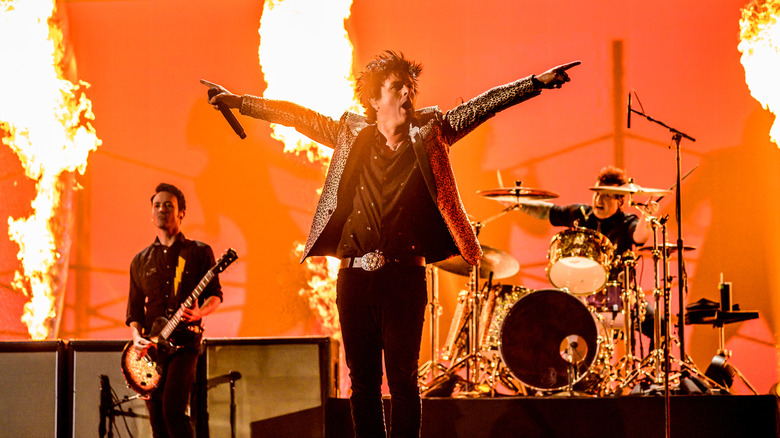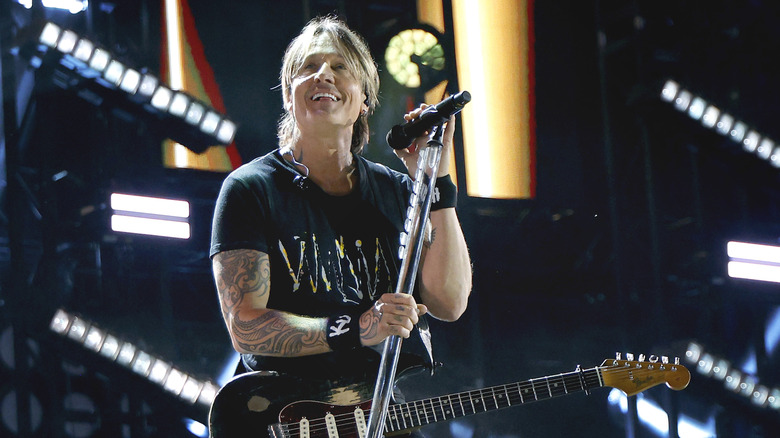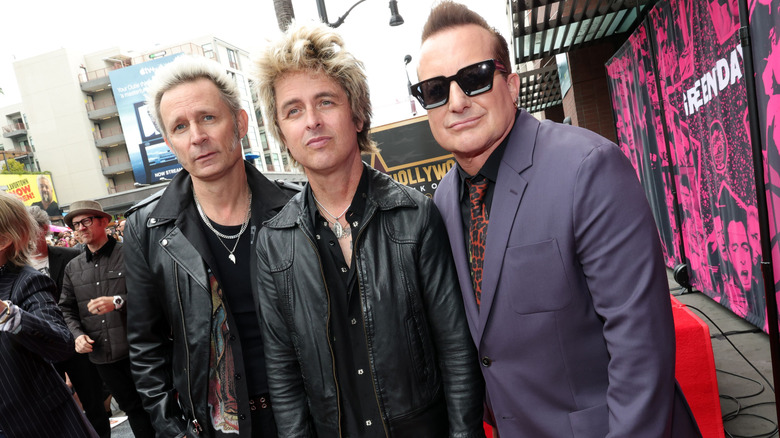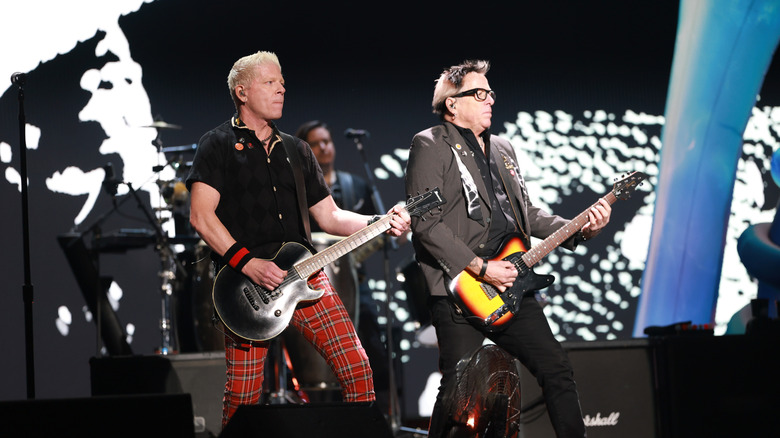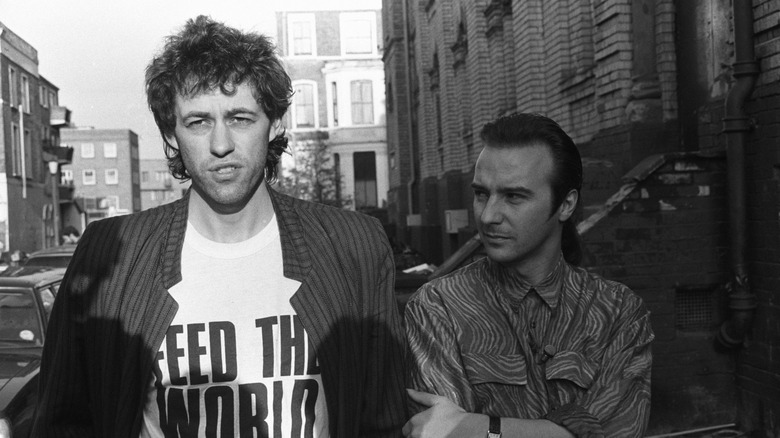Musicians Who Outraged Fans With Controversial Lyric Changes
The word "timeless" has come to denote those rare pop songs that transcend the industry's preoccupation with novelty to become beloved, evergreen hits. Such songs become cultural touchstones, for which it seems everybody, even non-fans, can sing the lyrics and melody, at least in part.
But such transcendence is based on the idea that songs are unchanging; that certain recordings represent the true, immutable version of the song in question. So what happens, for example, when times change and the lyrics to a classic song are no longer suitable due to the changing perspectives of the listening public? In several instances, artists have taken steps to alter the songs that made them famous, either removing lyrics that now seem offensive or dated, in favor of something more acceptable to contemporary tastes or discourse.
Most of the time, such changes are understandable and readily accepted by the artist's fanbase. But what about those times when lyric changes have caused a backlash? Here are just a few examples when controversial lyrics changes have led to an uproar.
Keith Urban
The Australian-born country artist Keith Urban has cultivated a huge following since relocating to Nashville, Tennessee, in the 1990s and breaking through in the U.S. country scene. By the early 2000s, Urban was a critically-acclaimed superstar, with numerous Grammy awards under his belt as well as several singles that topped the Billboard Country chart. And his star rose even higher with his 2006 marriage to the Australian movie icon Nicole Kidman, with whom he also started a family.
Kidman became the subject of many of Urban's best-known songs thereafter. However, when the couple shocked the world with the announcement that they had split in 2025, the singer seemingly felt unable to continue performing the lyrics to one particular song during live performances. The song in question is "Fighter," a 2016 hit that was reportedly inspired by a conversation between Urban and Kidman and which contains the lyric "When they're tryna get to you, baby, I'll be the fighter."
But as footage from one recent concert shows, Urban has flipped the lyric, singing: "When they're tryna get to you, Maggie, I'll be your guitar player." The change refers to Urban's new guitarist, Maggie Baugh, and seems to suggest that the two are romantically involved. After Bauch shared footage of the moment on Instagram, fans went into a frenzy, accusing Urban of lacking class for dedicating a song that was originally meant for his wife to the new woman in his life.
Green Day
Green Day is one of pop-punk's biggest ever acts, having emerged in the San Francisco Bay Area in the 1990s as cult favorites and cementing their position on the Billboard charts the following decade, most notably with the release of their 2004 album "American Idiot," which topped the Billboard 200 chart, won the band a Grammy, and spawned the monster single of the same name.
As the title of the record suggests, Green Day never shied away from delivering biting critiques of their home country. And despite the band not quite maintaining the chart relevance they enjoyed at their commercial peak, that has continued in the 2020s, a time when the political landscape has come to be sharply at odds with the views of primary lyricist Billie Joe Armstrong.
Though Armstrong's lyrics to "American Idiot" rail against the "redneck agenda" that he perceived in American society in the early 2000s during the War on Terror, his decision to change the lyrics during Donald Trump's second presidency from "I'm not part of the redneck agenda" to "I'm not part of the MAGA agenda" — referencing the "Make America Great Again" movement of Trump supporters — has received criticism from those on the right. Notably, Trump backer Elon Musk hit out at Armstrong in January 2024 for the alteration, tweeting: "Green Day goes from raging against the machine to milquetoastedly [sic] raging for it." Whether Musk was aware of the political stance the band has maintained throughout much of its career is unclear.
The Offspring
Another California pop-punk outfit who enjoyed their commercial breakthrough in the 1990s and has earned respected veteran status ever since is The Offspring, and, like Green Day, the group has seen fit in recent years to change their lyrics to make a point about current events. In the case of The Offspring, which is led by frontman Dexter Holland and guitarist Kevin "Noodles" Wasserman, it was the COVID-19 pandemic which led to the lyrical update.
The early months of the pandemic were terrifying for people around the world, with figures showing that the disease, which originated in China and quickly spread, was far more dangerous than other diseases of the same type, such as influenza. As a response, many nations ordered strict provisions, such as widespread lockdowns, to minimize transmission and hopefully protect as many vulnerable people, such as the elderly or those with compromised immune systems, while experts worked to develop a vaccine.
In 2021, with COVID-19 vaccines increasingly available, an end to the pandemic was in sight; however, the development was complicated by a wave of vaccine-hesitancy, stoked by anti-vaccine discourse online. To encourage uptake, The Offspring released a reworking of their 1994 hit "Come Out and Play," changing the lyric "you gotta keep 'em separated" to "You gotta go get vaccinated." "Live shows aren't gonna happen until you go get vaccinated. So we thought we'd have a little fun with one of our old songs," they explained in a social media post (via Loudwire). However, despite meaning well, the change was met with anger by anti-vaxxers.
Band Aid
Arguably the biggest charity supergroup of all time, Band Aid was organized by musicians Bob Geldof, of the Irish band The Boomtown Rats, and Midge Ure of Ultravox, in response to the horrifying drought that was claiming hundreds of thousands of lives in Ethiopia in 1984. The pair recruited the cream of British and Irish pop music, including David Bowie, George Michael, and Bono, to record the single "Do They Know It's Christmas?" which topped the singles chart in 14 countries and raised millions for charitable causes. It inspired the American-led, "We Are The World," which was released just months later.
The song has been rerecorded with new generations of musicians multiple times, but as the decades have worn on, the song has attracted a great deal of criticism from those who see it as viewing Africa from a colonialist perspective, and for being an example of "white savior" activism. In recent years, several Black artists, such as the British-Ghanaian singer Fuse ODG, have criticized the song's patronizing lyrics. In 2014, he refused to be part of the project despite an offer of lyrical changes. The lyrics were updated to reflect the Ebola crisis that was ongoing in Sierra Leone, Guinea, and Liberia, but still made several artists uneasy. Emeli Sande, who sang on the song and said that edits to the lyrics she had made were not included in the final edit, stated that "a whole new song is required" (via the BBC).
